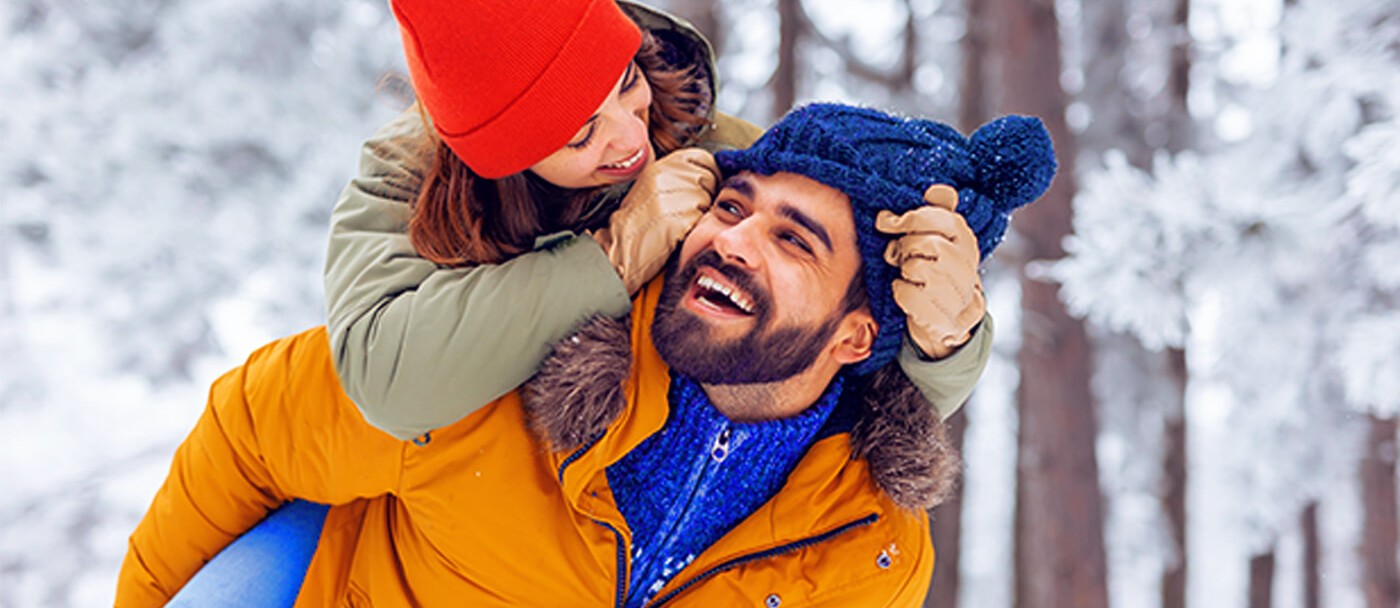5 reasons to go outside in winter… snow or not!

Winter is cold and flu season. Drops in temperature are not the only ones responsible for the increase in these diseases, but studies show that they contribute more or less directly.
However, going outside during the cold season can have a positive effect on the health of both children and adults. Whether it’s at the beginning or the end of winter, whether there’s snow or not, spending time outdoors has more benefits than you might think!
Here are 5 reasons why you should go outside.
1. Going outside reduces the risk of spreading germs
It’s wrong to say that you get sick because of the cold. The cold doesn’t give you the flu. However, many viruses remain contagious longer and replicate more easily in cold weather. This is the case of the well-known rhinovirus, responsible for many colds.
The cold also modifies the outer membrane of the flu virus, which could facilitate its transmission from one individual to another.
The drier air in our overheated homes could also contribute to prolonging the contagion period of the flu virus and could therefore be partly responsible for the proliferation of the disease. The mucous membranes of your nose and throat also tend to be drier, which makes it easier for viruses to settle.
In winter, we spend a lot more time indoors, locked up with our germs. Sneezing, coughing, runny noses… Germs never miss an opportunity to attack anyone within their reach.
In the house, germs are everywhere. No matter how often we wash our hands, it is impossible to avoid them. Comfortably installed inside, they survive for a good while on surfaces, sometimes for weeks. They appreciate confinements, but also gatherings.
TIP: Inhaling cold air could affect the immune response of the respiratory tract that should take care of viruses. With this in mind, wearing a scarf or neck warmer over the nose and mouth is recommended.
8 tips to avoid getting sick this winter
- Wash your hands several times a day.
- Clean surfaces in your home regularly.
- Avoid touching your face (without realizing it, we do it 9 to 23 times a day!).
- Eat well, make sure your diet includes vitamin-rich foods that strengthen the immune system (green vegetables, citrus fruits, green tea, etc.) or that contain vitamin D (egg yolks, milk, plant-based drinks and foods fortified with vitamin D, oily fish, etc.).
- Drink plenty of water.
- Stay active.
- If the air is dry, use a humidifier.
- If you are more vulnerable, you can get a flu shot.
2. Going outside gets you moving!
We move less during winter. In fact, according to a study, in the event of snowfall and ice, people are 3 times more likely to postpone physical activity.
Yet, simply walking in the snow, wrapped up and wearing good winter boots, is an aerobic activity. This is a great way to get exercise without having to pay a gym membership!
Health experts estimate that children should do at least 60 minutes of moderate to high-intensity physical activity each day. For adults, 30 minutes of moderate-intensity activity per day is recommended.
Not only does exercise improve physical fitness, but it also has an effect on the brain. It improves metabolism and blood flow in the brain. It helps with memory and concentration, increases executive functions (planning, problem solving and reasoning), improves its functioning, and delays its decline.
Aerobic activities contribute to the secretion of hormones such as endorphins, which improve mood and can lead to a feeling of euphoria, dopamine, which boosts motivation by activating the reward system, and serotonin, which acts on anxiety and depressive moods.
Not interested in taking walks? Rediscover the pleasure of going down a slope on a sled, skating on a river, organizing a hockey game with friends.
The weather is not too inviting? Use your imagination! Organize a treasure hunt, create a mandala from finds made in the forest, get the chalk sticks and bubbles, play with buckets, shovels and sand toys and enjoy the last snowbank in the yard…
3. Reducing the effects of pollution and allergy symptoms
The air quality in a home is often not optimal. Smoking, heating, humidity and mold, building materials and furnishings, allergens, household products, etc. There are many sources of pollution. Even if there are various ways to reduce their impact on our health, it is practically impossible to completely eliminate them.
For more information, visit: Improve indoor air quality in your home - Canada.ca
Studies show that indoor air pollution levels are generally higher than those outdoors. Going outside provides a breath of fresh air that is good for our health.
Also consider that respiratory viruses spread within a two-metre radius of the infected person. Indoors, proximity is hard to avoid. Almost every time you enter a room that is already occupied, you are at risk of contagion.
With all the outbreaks of respiratory illnesses, breathing fresh air helps keep your lungs healthy and helps reduce allergy symptoms and asthma caused by dust mites and pet hair!
TIP: Is outdoor pollution high in your area? There’s nothing stopping you from getting away. This will allow you to discover other places and other activities. Changing your habits is easier when you take a step back and try something new!
Get your local Air Quality Health Index here: Air Quality Health Index - Canada.ca
4. Get out and stock up on vitamin D!
The sun helps strengthen the immune system by providing the body with the vitamin D it needs. That’s right, even in winter.
Vitamin D is called the “sunshine vitamin.” Its particularity is that it is produced by our body when it is exposed to the sun. However, several factors influence the amount of vitamin D produced, such as smog, clouds, age, skin pigmentation, the use of sunscreen, the amount of skin exposed, the time of day or of the year, etc.
Vitamin D is essential for healthy bones and teeth, since it allows the absorption of calcium and phosphorus. It also helps strengthen the immune system and could reduce the risk of diabetes, certain cancers and cardiovascular diseases.
Although vital, many Canadians are far from providing their bodies with the recommended doses of vitamin D.
In winter, the opportunities to expose our skin to the sun are rarer, and in northern regions, the amount of UVB rays that reach us is lower. We must therefore take advantage of every opportunity. You can obtain sufficient vitamin D through your diet or by taking supplements.
P.S. If you are staying outside for an extended period, remember to use sunscreen.
5. Going outside helps improve sleep
It is known that physical activity contributes to restful sleep. As mentioned previously, moving is beneficial, but that's not all.
Exposing yourself to daylight helps regulate the circadian cycle. Circadian rhythms, which many call “the internal clock”, are the changes in mental and physical states that occur over a 24-hour period.
These rhythms are controlled by the brain but influenced by the light that enters the eye. By stimulating the cells of the retina, light sends nerve impulses to the brain, ordering it to stop producing melatonin, the hormone that promotes sleep.
Exposure to sunlight helps resynchronize the internal clock. For example, to minimize the effects of jet lag, travellers are advised to spend time in the sun, ideally in the morning, once they arrive at their destination.
This sleep-wake cycle can also be disrupted in winter, as there is less natural light, the days are shorter and darkness arrives early.
3 tips for enjoying time outside
1. Dress for the weather
Dressing improperly when going outside in winter will make you want to go back inside as soon as possible. Clothing that is too warm or doesn’t breathe can make outdoor activities uncomfortable in no time. Similarly, make sure you are warm enough, from head to toe, and that your clothing is waterproof.
TIP: The multi-layer system, which consists of layering clothing, allows you to cope with different weather conditions while enjoying maximum comfort.
2. Have fun while staying safe
Practice your activities in appropriate areas, away from snowplows, tractors and cars that might have to deal with reduced visibility and slippery roads. For more risky activities, such as skiing, snowboarding and sledding, wear a helmet! And take the time to properly maintain and de-ice your driveway to avoid falls.
3. Beware of frostbite
In winter, temperatures can change drastically in a short period of time. If you are going out for an extended period or moving away from home, remember to bring a change of clothes. Wet clothes or clothes that are not warm enough can cause frostbite.
To recognize the symptoms of frostbite and learn how to treat it, read: Frostbite | Gouvernement du Québec










